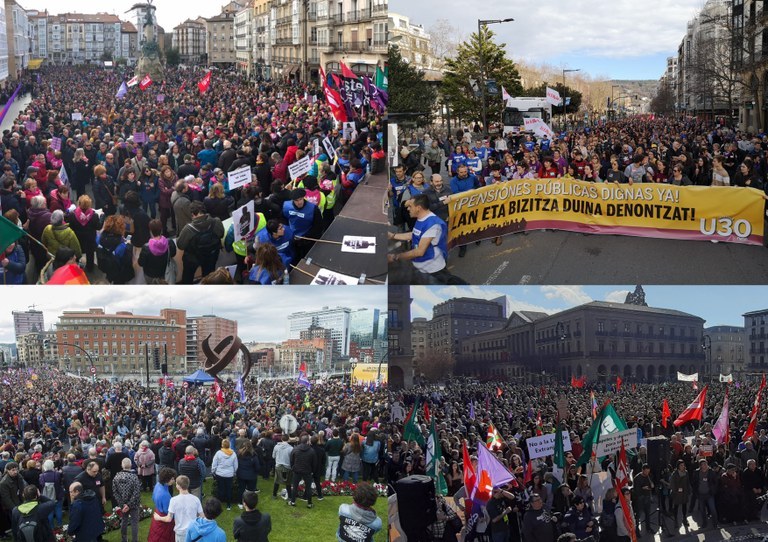January 30, a historic day

The incidence of the strike on the 30th of January increased as the day wore on in the Basque Country. Early in the morning, the strike following recorded in industry was already very broad; by mid-morning it was confirmed that education and other public services, as well as many shops and local commercial businesses had joined the strike that had been called to demand “work, pensions and decent living.”
The important response obtained by the call for a general strike shows that it was necessary and it has shown that there is a significant part of our society that identifies with the reasons and demands behind it. The strike has managed to connect with thousands of people who do not see themselves reflected in the idea of the ‘Basque Oasis’. The 30th of January was the clearest expression showing that there is a part of the Basque Country that demands, that fights, that does not accept the official discourse that we are living in the best of all possible worlds. The increase in inequality in a cycle of economic growth is generating resentment that has been expressed politically with a general strike.
In the morning demonstrations in the 4 capital cities alone (Bilbao, Donostia, Gasteiz and Iruñea), over 145,00 people took part. For the first time, to this must be added other protests in different towns and the over 100 multitudinous marches that were held in the afternoon. It should also be remembered that the strike has had solidary concentrations throughout the state as a whole, as well as many displays of international solidarity.
The result of the general strike, called by the majority of Basque trade unions, along with social organisations, made it clear that alliances have an indisputable potential. The 30th of January was a historic day, which is going to be held in the memories of the thousands of workers who went on strike, of the thousands of pensioners who took to the streets, as well as in the memories of the supporters of the feminist, ecologist, LGTBIQ+ or anti-racist movements, amongst many others.
Regrettably, once again we have to report that the repression against the strikers was disproportionate. Hundreds of strikers were identified and the feminist picket line was subjected to harsh charges by the police force. In addition to this, ten people were arrested.
STRIKE DATA BY SECTOR
In industry, many of the large companies in the industrial sector were completely brought to a standstill. For instance the strike in companies like CAF, Arcelor-Mittal, Thyssenkruup, Siemens-Gamesa, Sidenor or Unilever was followed by over 70% of the workers. Furthermore, the strike was followed in full in many industrial cooperatives. It was also supported in many SMEs due to the growing job insecurity that has an important incidence in small companies. It may be concluded that most of the companies experienced a significant stoppage of at least 30%.
Regarding the public sector, it should be mentioned that in spite of that fact that in general, temporary working in the public sector exceeds one third of the workers, and the minimum services established totally condition the right to strike, it may be said that the strike has been widely followed. Some examples of this were seen in education, healthcare, care homes, transport and means of communication, amongst others. In public education for example, the strike affected over 80% of the centres and the general following was over 60%. In the case of subsidised centres, the strike was followed by over 70%. In primary health care, the strike following was general as a result of the serious situation experienced by workers. The case of the care homes for the elderly should also be mentioned, where over 90% of the workers who were effectively guaranteed their right to strike supported the protest. This figure was even higher in Gipuzkoa, where the workers have been on strike for 200 days due to the negotiations for the sectorial collective bargaining agreement.
The following in private services has been highly significant, for instance over 70% in the case of school dining rooms. It was also very important in the sectors of street cleaning, cleaning of buildings and commercial premises, in outsourced sectors from the public administration, in shops and local commerce and in offices, as well as in the ports of Bilbao and Pasaia, where the strike received massive support.
